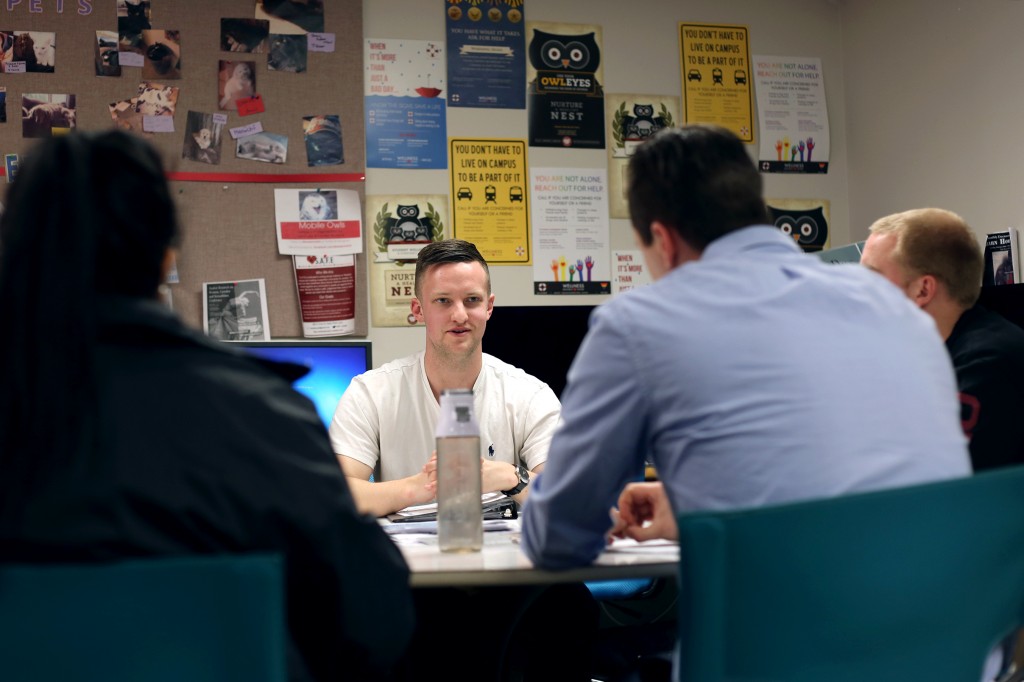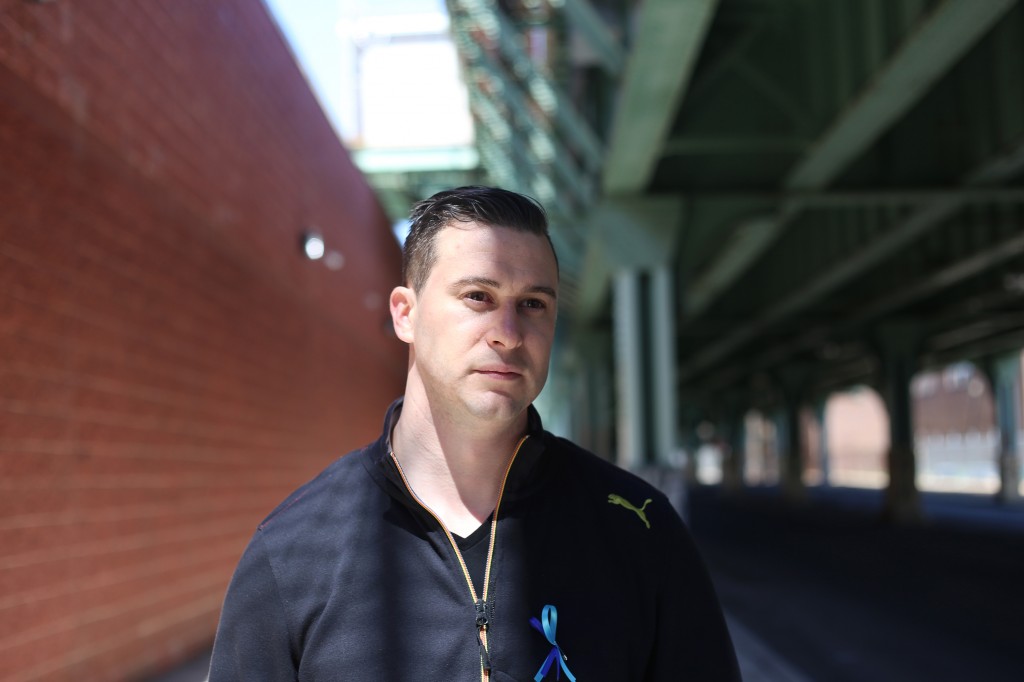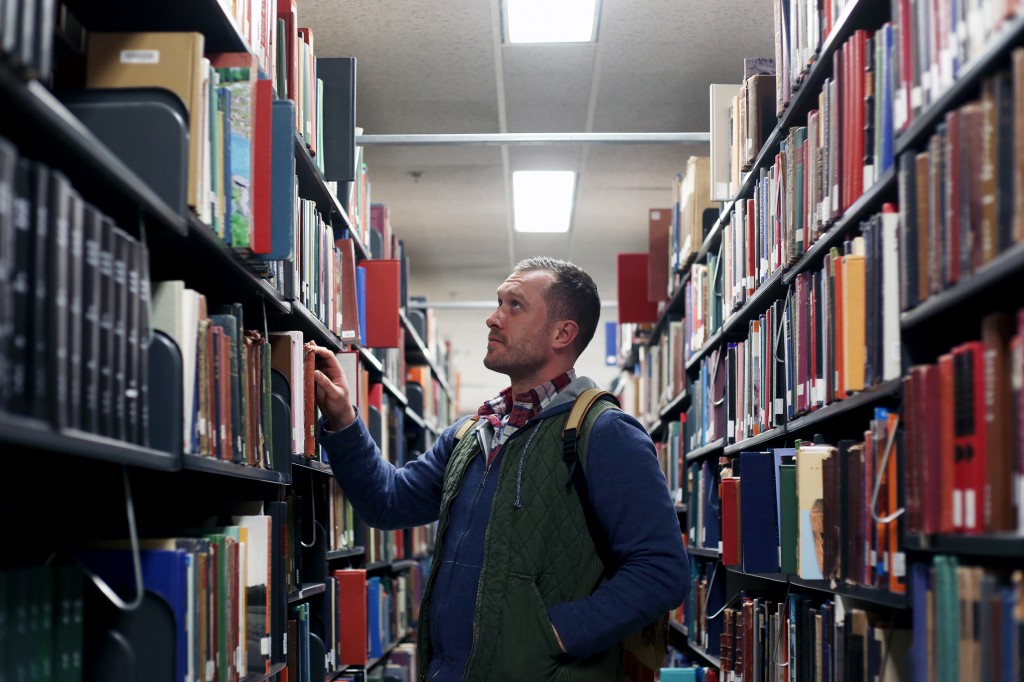During a year in which Kevin was struggling with addiction, he spent about $4,000 on alcohol and drugs, including Oxycontin pills – a single one cost him $25 on the street.
“Hey Kev, listen – you ever try an Oxycontin pill before?” Kevin said his friend asked. “Listen, you can take it, and just don’t do it again. You know, it’s a great experience – it’s a great kind of high and everything, and you don’t have to take it again.”
“I promise.”
After about four months passed, Oxy became too expensive for Kevin – so he began snorting heroin for three months. It wasn’t until he was about to use the drug through an IV that he said he realized he needed to get some help.
Kevin, who asked not to include his last name in this story because of the societal stigma that surrounds those struggling with addiction and in recovery, is now a 21-year-old undeclared freshman. He took some time off from school during his first year to recover. Now, he’s doing well in school and about one year and five months clean.
Kevin wasn’t alone. There were about 23.5 million Americans addicted to drugs and alcohol in 2010, according to the Partnership for Drug-Free Kids. Drug use is highest between those 18 to 20 – 23.9 percent used an illicit drug in a month-long span in 2012, the National Institute on Drug Abuse reported last year.
Across the nation, colleges and universities are working toward combating addiction through discussion groups, housing and academic accommodations, alcohol- and drug-free events and more. At Temple, there are a handful of resources available to students in recovery, though many are recent as well as student-led and initiated. While some here say that Temple is off to a good start in remedying this problem, several say the university still has a ways to go.
“I still deal with a lot of issues as far as self-esteem and stuff like that, but I’m glad I’m able to kind of attack life and attack those problems in a sober way because I know that’s the healthiest way,” Kevin said. “Just, if I can get the message out there to the other people that are struggling – there is a way out.”
A ‘community with hope’
The air conditioner hums in the bottom of Mitten Hall in the Wellness Resource Center, where a group of about six are sitting in silence.
A blue chair behind the table has a phrase embroidered on its back. It says, “Be Well.” Some people are checking their phones, others are looking around the room.
They’re there for a student-led discussion hosted by Unicovery, a student organization started on Main Campus in November for students in recovery, be it from drugs or alcohol, mental health issues or just students who are concerned about their overall wellness.
Unicovery was conceived by Tyler Hurst, a graduate student working toward his master’s degree in social work. He’s also a person in recovery who said he had a vision of creating a collegiate recovery program or collegiate recovery community on Main Campus.
CRPs and CRCs are a growing trend across the United States – they’re created when a school devotes a space, a faculty, a staff or team to working with students in recovery. They’re both represented by the Association of Recovery in Higher Education, which provides colleges with the educational materials and some resources to run the programs. There are about 50 in the nation, with six in the Northeast region, including at schools like Rutgers and Penn State, according to the association.
Right now, Hurst said there are more than 50 students on Unicovery’s listserv with an active, core group of about 10. Besides Hurst, the group is also run by Jake Schlottman, a senior public health major who said he’ll continue the group next year.



Hurst said he knows there’s a need for a program like this, especially in North Philadelphia, but right now, visibility is an issue.
“College is a breeding ground for the starting of addiction because that’s how students tend to look at having a good time, and how much you can drink becomes a competition,” Hurst said.
Unicovery is in its baby steps, but in the future, Hurst and Schlottman said they hope to create more sober events on Main Campus and even have sober tailgating events at football games. In the long term, they want to create a sober living facility with a full staff devoted to assisting students in recovery – something some faculty and students said is missing.
“College is a breeding ground for the starting of addiction because that’s how students tend to look at having a good time, and how much you can drink becomes a competition.” Tyler Hurst, Unicovery co-founder
“One of our goals is going to try to change the way recovery is looked at,” Hurst added. “A lot of people hear the word ‘recovery’ or ‘substance abuse’ or ‘addict,’ and the things they think of aren’t pleasant, so one of our missions is going to be to try to change this perception – to help them understand that kids in college can be in recovery too.”
It was March 9 when Brian Korn, a 29-year-old senior majoring in German, decided to check out his first Unicovery meeting. He knew of Hurst through a friend and after some back-and-forth through email, finally cleared his busy schedule on that Monday night. He came with a cup of iced coffee.
He just transferred from the University of Pittsburgh, the place where he quit drinking in 2008, a habit that began at 18. It’s taken some time for him to get back on track, but now he’s focusing on his studies, and through meetings and places like Unicovery, he said he feels positive.
He said the group is a “community with hope.”
The students
Conor, a freshman environmental studies major, said he knew he had a problem with alcohol during a family vacation to New Orleans.
He and a friend went out one night, grabbed a few drinks, and the events escalated. Conor said after he got thrown out of a strip club, he passed out in a gutter. The next morning, after he made it back to his hotel room, his parents found him in his bed covered in blood and vomit. He was 16.
“That was the first time that I had looked in the mirror, and I was like, ‘What’s wrong with me?’” he said. “And that’s the first time I had tried to quit drinking and doing drugs.”
His attempts were unsuccessful, and he continued to use.
After Conor, who is only including his first name because of an Alcoholics Anonymous tradition, was kicked out of high school after using extensively at his senior prom, he said he saw two options.
“I was either going to kill myself or go to rehab,” he said.
Caroline, a junior social work major who’s also not including her last name because of societal stigma, said addiction never ran in her family. From the Main Line, she said she never suffered any trauma during her childhood. She had friends and went to good schools, but for some reason, she felt a disconnect within herself that led to her drinking and drug use. Eventually, her drug of choice became heroin, she said.
“I’ve never felt such a dark, lonely place in my life,” she said. “It just destroyed every part of me – mentally, emotionally, physically, spiritually. I was like, had no purpose.”
She’s been sober for about four years, and Conor has been sober for about two years. But both still regularly attend meetings to continue their recovery. Caroline attends a 12-step meeting in her hometown and has also made friends who have been through the same experiences which she said is one of her biggest sources of support.
Conor regularly goes to meetings in the city, in his hometown, is a sponsor and has one himself. He also goes to 12-step meetings on Main Campus, where he said he’s made some close friends.
“Not all colleges have any sort of recovery or people who are familiar, and we’re so lucky as a recovery community to live in Philadelphia where you can go anywhere at any time,” Caroline said. “If you want help, you can get it, and Temple is … starting to have those options, which I think is awesome.”
Getting support
Kate Schaeffer, the program coordinator of Alcohol & Other Drugs, Interpersonal Violence and Mental Health at the Wellness Resource Center, said she’s happy with the resources Temple has for students in recovery, but added that there’s still a list of aspirations for the future.
On that list is a sober living facility on Main Campus, like the Haven at Drexel University. The Haven is a housing resource for undergraduate students who have a year of sobriety. Residents are overseen by a licensed clinical recovery coach, have 12-step meetings available as well as weekly sober events, according to its website.
Temple’s closest resource to the Haven is the Healthy Lifestyles Program LLC, but it’s not a recovery program. Schaeffer said that if a student wanted a spot at the Haven, she could try to secure one in West Philly, far from Main Campus.
Schaeffer, who is also Unicovery’s adviser, said it’s something “Temple is definitely aware for the need for.”
But, it’s an issue of space, she said.
“We’re still new to being residential,” Schaeffer said. “As far as culture and movement and acquiring of buildings really, and being able to have spaces for things, we’re only 15 years into being residential.”
If a student needs to go to rehab during a semester, Schaeffer said Temple’s medical withdrawal process could help. If not, students could make accommodations through Disability Resources and Services. Otherwise, it’s on a case-by-case basis between student and professor.
Group and individual counseling is also available through Tuttleman Counseling Services. Tuttleman also provides group therapy sessions for students who may have a person struggling with addiction in their family.
Schaeffer doesn’t have a number on how many students are facing addiction or are in recovery at Temple because it’s a hard number to gauge, but she said 400 students are brought into the Wellness Resource Center a year for violating the Student Drug and Alcohol Policy. Her job involves sanctioning those students.
Amanda Jamison, educational coordinator of the Campus Alcohol & Substance Awareness unit and a psychologist at Tuttleman, said she also doesn’t know how many students take advantage of Tuttleman’s resources for recovery. She said about 2,500 came in for counseling services last year.
Students and advocates are initiating more programs for students to take advantage of. In addition to Unicovery, there’s a student-led 12-step meeting held every Thursday at 6 p.m. in Morgan Hall South.

Before this became an option, some students in recovery said they often went into Center City to participate in Alcoholics Anonymous or Narcotics Anonymous meetings. Many still do.
Recovery programs on college campuses are a growing trend, some experts say. But with each campus comes a different policy, varying in comprehensiveness.
Jason Whitney, program coordinator of Penn State’s Collegiate Recovery Community said in addition to providing a space, staff, meetings and more for students, it helps students whose grades have suffered during addiction “clean up their transcripts” through a petition for retroactive health withdrawal. The option gives them a “do-over,” he said.
St. Joseph’s University has similar programs as Temple, but also has AA and NA meetings on campus, as well as an ongoing list of contact information for students who are in recovery that want to help others, said Katie Bean, assistant director of St. Joe’s Student Outreach & Support Wellness, Alcohol & Drug Education.
St. Joeseph’s was also recently awarded a $10,000 grant through Transforming Youth Recovery – a nonprofit that helps students in recovery – to further develop and start programs.
Bean and Schlottman from Unicovery met last month to discuss how to apply. He said he plans to during the summer.
Jillian Bauer, who was a student at Temple from 2002-06 and began teaching in the School of Media and Communication in 2007, is also a person in recovery. Bauer also started an Internet blog last year called “The Rooms Project” devoted to sharing the stories of those in recovery.
She said there’s more the university could be doing, though the responsibility is equally on them and students who are looking for the resources.
“I’ve had students come to me who are either struggling or are living in recovery themselves or are trying to enter recovery, and really what I’m finding is they’re not really getting the support that they need from faculty because it’s not viewed as, by many people, as an illness,” Bauer said.
“So, if a student leaves to go to a rehab facility, they’re less likely, I think, to initially tell their professors that that’s where they’re going, whereas, if they were diagnosed with cancer and going through chemo, they would get a lot of sympathy from their professors,” she added. “So a lot of students don’t, really.”
Looking forward
Conor, Caroline, Brian and Kevin all say the most helpful part of their recovery process has been a strong support group – whether that be through programs at Temple or in their hometowns, through friends or family.
And aside from school work that keeps them occupied and focused on long-term goals, they all have their own hobbies.
Conor likes to go to concerts – he likes jam bands like The Grateful Dead and Lettuce – and is an active photographer. Brian keeps his head in books and likes to peruse the aisles of a library. Caroline remains active in yoga. And Kevin – he’s keeping his eye on his degree.
He doesn’t know exactly what he wants to do yet, but he wants a good job somewhere in New York or here in Philly.
“I guess I just realized in my mind – like, you know, I can’t continue to live like this,” Kevin said. “I’m not going to be where I want to be one day. I’m not going to live a happy life, I won’t be able to have a wife and kids and things like that … so I guess recovery was my only option.”
Patricia Madej can be reached at patricia.madej@temple.edu and on Twitter @PatriciaMadej.
Photos by Jenny Kerrigan.
Video by Kate Reilly.
Infographic by Donna Fanelle.
Produced and designed by Patrick McCarthy.